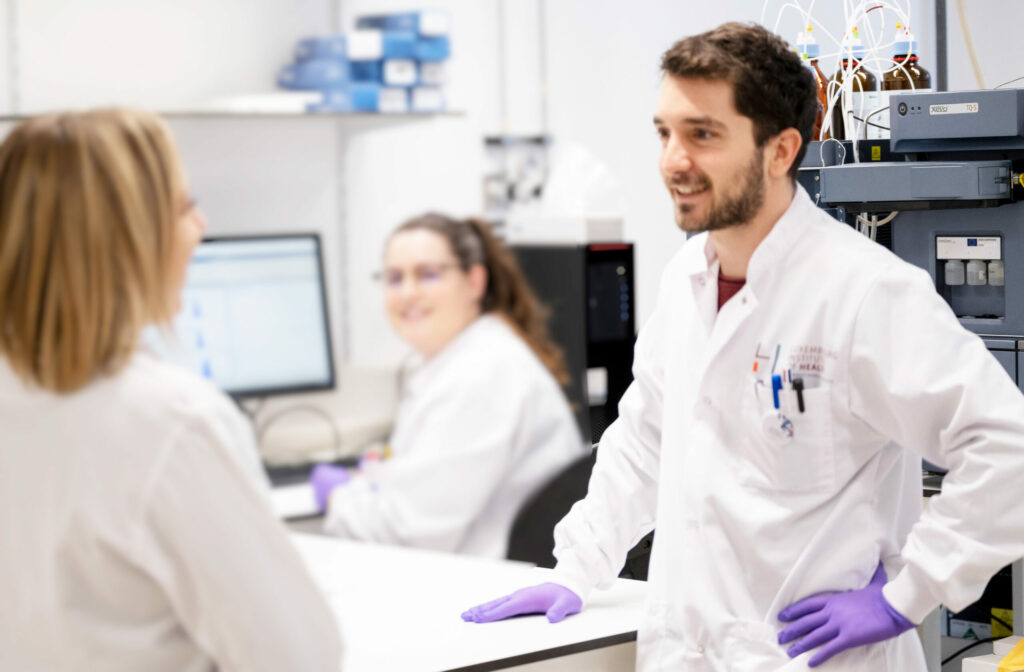
Immuno-pharmacology and interactomics
The Immuno-Pharmacology and Interactomics group focuses on the mechanisms that lead to cellular signaling disregulation and their impact in health and disease.
Activities
Altered cellular signalling and immune dysregulation are hallmarks of most auto-immune, inflammatory and chronic viral diseases. The expression, signalling and activity of chemokines and IFN are often altered in these pathologies but the molecular mechanisms and fine regulation at play are not completely understood. Most viruses have evolved strategies to hijack, bypass or lure these signal transducers and cellular effectors to favour their replication and/or to corrupt or evade immunity.
Our research interests revolve around two axes:
- Fundamental research aiming at gaining new insights into the complex structural and cellular mechanisms that lead to altered cellular signalling and cell transformation.
- Translational research aiming at developing novel tools and therapeutic approaches to interfere or modulate these processes and viral replication.
Projects & clinical trials
Some of the group’s research projects include:
- Studying the structure and function of human chemokine receptors CXCR4, CXCR7 and CXCR3 and viral receptors and deciphering homeostatic and pathogenic molecular interactions, signalling and intracellular trafficking induced by their endogenous and viral ligands.
- Designing novel chemokine-receptor inhibitors interfering with chemokine receptor signalling as well as with HIV entry and developing viral tools for applied research and for determining viral tropism as well as resistance to entry inhibitors.
- Studying the molecular mechanisms of HIV assembly and viral protein trafficking, paying particular care to the impact of subtype-related variability.
- Investigating the molecular mechanisms leading from chronic inflammation to cancer development in chronic viral infections, focusing on the role of the Interferon-induced proteins APOBEC3 and SAMHD1 in cellular DNA damage, viral integration of DNA viruses and cellular homeostasis.
Featured team members
Scientific publications
-
Molecular basis of promiscuous chemokine binding and structural mimicry at the C-X-C chemokine receptor, CXCR2 – 06/03/2025
-
Design, Synthesis and Pharmacological Characterization of the First Photoswitchable Small-Molecule Agonist for the Atypical Chemokine Receptor 3 – 18/02/2025
-
Inclusion of ACKR5 in the systematic nomenclature of atypical chemokine receptors – 03/02/2025
-
High-affinity ELR+ chemokine ligands show G protein bias over β-arrestin recruitment and receptor internalization in CXCR1 signaling – 29/11/2024
-
International Union of Basic and Clinical Pharmacology. CXVIII. Update on the nomenclature for atypical chemokine receptors, including ACKR5 – 22/11/2024
-
Development of chemokine receptor modulators for improved cancer immunotherapy – 02/12/2024
-
Heterogeneous expression of the atypical chemokine receptor ACKR3 in glioblastoma patient-derived tissue samples and cell cultures – 01/12/2024
-
Longitudinal analysis of the gut microbiota during anti-PD-1 therapy reveals stable microbial features of response in melanoma patients – 13/11/2024
-
Patient-based multilevel transcriptome exploration highlights relevant chemokines and chemokine receptor axes in glioblastoma – 30/09/2024
-
Development of a NanoBRET Assay Platform to Detect Intracellular Ligands for the Chemokine Receptors CCR6 and CXCR1 – 01/01/2024
Related News

Job vacancies
There are no jobs matching this page at the moment. You can view all jobs via the button below.










